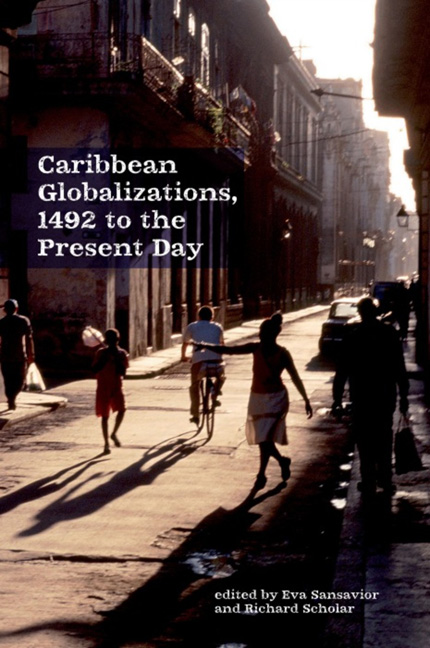Book contents
- Frontmatter
- Contents
- Contributors
- Prologue: Globalization, Globality, Globe-Stone
- Introduction
- I Globalizations in the Making
- II The Complex Present
- 6 Tobacco: The Commodification of the Caribbean and the Origins of Globalization
- 7 The Amaranth Paradigm: Amerindian Indigenous Glocality in the Caribbean
- 8 Aluminium: Globalizing Caribbean Mobilities, Caribbeanizing Global Mobilities
- 9 Race and Modernity in Hispaniola: Tropical Matters and Development Perspectives
- 10 Local, National, Regional, Global: Glissant and the Postcolonial Manifesto
- 11 Tropical Apocalypse: Globalization and the Caribbean End Times
- Acknowledgements
- Index
8 - Aluminium: Globalizing Caribbean Mobilities, Caribbeanizing Global Mobilities
from II - The Complex Present
- Frontmatter
- Contents
- Contributors
- Prologue: Globalization, Globality, Globe-Stone
- Introduction
- I Globalizations in the Making
- II The Complex Present
- 6 Tobacco: The Commodification of the Caribbean and the Origins of Globalization
- 7 The Amaranth Paradigm: Amerindian Indigenous Glocality in the Caribbean
- 8 Aluminium: Globalizing Caribbean Mobilities, Caribbeanizing Global Mobilities
- 9 Race and Modernity in Hispaniola: Tropical Matters and Development Perspectives
- 10 Local, National, Regional, Global: Glissant and the Postcolonial Manifesto
- 11 Tropical Apocalypse: Globalization and the Caribbean End Times
- Acknowledgements
- Index
Summary
The Caribbean is a region formed out of multiple intersecting and contested mobilities. On the human side this encompasses the movements of indigenous settlers of the premodern era, colonists and buccaneers of the early-modern era, those who made the middle passage into slavery, naval flotillas and privateers, indentured labourers and Maroons, and eventually tourists and diasporic migrants. On the non-human side it includes invasive plants and animals, viral and bacterial diseases, plantation commodity crops, ships and aeroplanes, maps and travel narratives, newspapers and archives, music and dances, etc. These Caribbean mobilities were central to the initial theorizations of mobile diasporas and transnationality (Gilroy, 1993; Basch, et al., 1994; Clifford, 1997); debates concerning creolization (Benítez Rojo, 1996; Glissant, 1989; 1997; Shepherd and Richards, 2002); as well as empirical studies of phenomenon such as ‘transnational families’ (Bauer and Thompson, 2006) and ‘long-distance nationalism’ (Schiller and Fouran, 2001). Thus Caribbean theorists and the field of Caribbean studies have been foundational to thinking about globalization as a situated process unfolding over a long period of time, generative of complex local negotiations.
Today, furthermore, there is also an emerging approach to critical mobilities research (Sheller and Urry, 2006; Urry, 2007; Sheller, 2011), which I want to suggest can help us to envision an even wider and more dynamic transnational (and transhuman) Caribbean studies. New approaches to global mobilities loosely allied under the rubric of the ‘new mobilities paradigm’ or ‘critical mobilities studies’ (Adey, 2010a; 2010b; Cresswell, 2006) combine analysis of elements such as urban form, migration, transportation, communication infrastructure, mobile technology, imaginative travel, financial flows, and tourism, in order better to highlight the relation between local and global ‘power-geometries’ (Massey, 1993), especially in regions like the Caribbean. By Caribbeanizing our approach to global mobilities, and globalizing our approach to Caribbean mobilities, I aim to generate alternative ways of thinking about and empirically researching globalization historically and today.
A good way to think about Caribbean mobilities is in terms of ‘tidalectics’ as described by Elizabeth DeLoughrey (2007) in her interpretation of the concept first developed by Caribbean poet and theorist Kamau Brathwaite. In her book Routes and Roots, DeLoughrey (2007: 51) points out that ‘[w]hile western scholars are increasingly turning to the Atlantic as a paradigm of transnational crossings and flows, the conceptual implications of this oceanic model have been deeply explored in the Caribbean, where tidalectics reconceptualizes diaspora historiography’.
- Type
- Chapter
- Information
- Caribbean Globalizations, 1492 to the Present Day , pp. 189 - 202Publisher: Liverpool University PressPrint publication year: 2015



